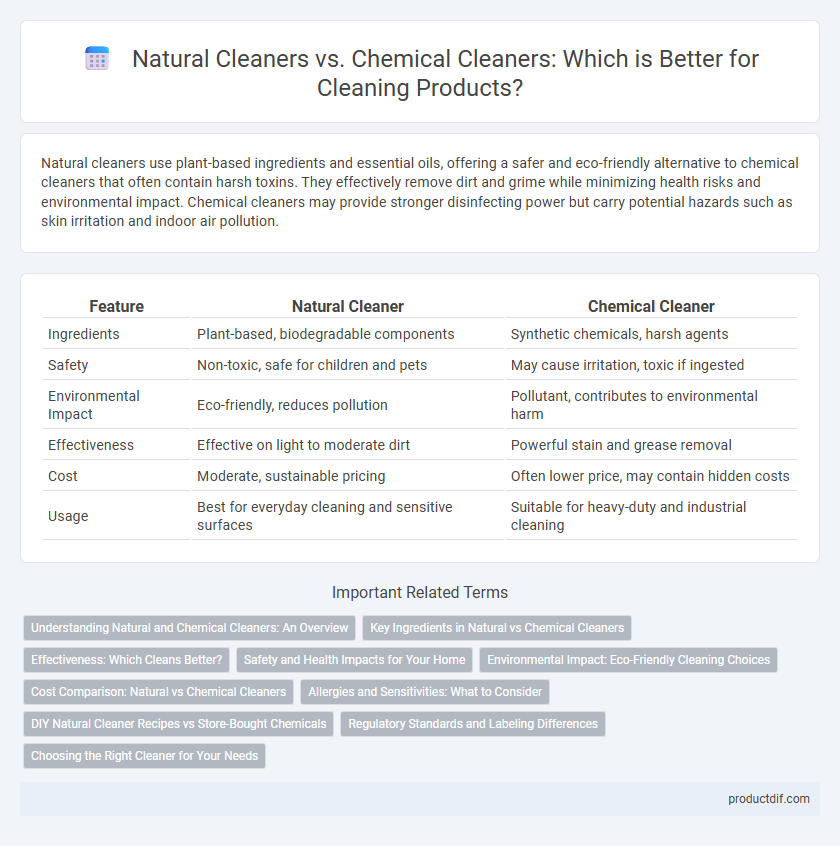Natural cleaners use plant-based ingredients and essential oils, offering a safer and eco-friendly alternative to chemical cleaners that often contain harsh toxins. They effectively remove dirt and grime while minimizing health risks and environmental impact. Chemical cleaners may provide stronger disinfecting power but carry potential hazards such as skin irritation and indoor air pollution.
Table of Comparison
| Feature | Natural Cleaner | Chemical Cleaner |
|---|---|---|
| Ingredients | Plant-based, biodegradable components | Synthetic chemicals, harsh agents |
| Safety | Non-toxic, safe for children and pets | May cause irritation, toxic if ingested |
| Environmental Impact | Eco-friendly, reduces pollution | Pollutant, contributes to environmental harm |
| Effectiveness | Effective on light to moderate dirt | Powerful stain and grease removal |
| Cost | Moderate, sustainable pricing | Often lower price, may contain hidden costs |
| Usage | Best for everyday cleaning and sensitive surfaces | Suitable for heavy-duty and industrial cleaning |
Understanding Natural and Chemical Cleaners: An Overview
Natural cleaners, derived from plant-based ingredients like vinegar, baking soda, and essential oils, offer biodegradable and non-toxic alternatives for household cleaning tasks. Chemical cleaners often contain synthetic compounds such as ammonia, chlorine, and sulfates, which provide powerful stain removal and disinfecting properties but may pose health and environmental risks. Understanding the composition and effects of both natural and chemical cleaners helps consumers make informed decisions based on safety, efficacy, and ecological impact.
Key Ingredients in Natural vs Chemical Cleaners
Natural cleaners primarily use plant-based ingredients such as vinegar, baking soda, lemon juice, and essential oils, which are biodegradable and non-toxic. Chemical cleaners often contain synthetic compounds like ammonia, chlorine bleach, sulfates, and phosphates that provide strong disinfectant and stain-removal properties but may release harmful fumes. The key difference lies in the natural cleaners' focus on eco-friendly, biodegradable substances, whereas chemical cleaners rely on powerful synthetic chemicals for enhanced cleaning performance.
Effectiveness: Which Cleans Better?
Natural cleaners, derived from plant-based ingredients like vinegar and baking soda, effectively remove everyday dirt and grime while being non-toxic and eco-friendly. Chemical cleaners often contain powerful agents such as bleach and ammonia, delivering faster and stronger stain removal on tough surfaces but may pose health and environmental risks. Studies show that for heavy-duty cleaning tasks, chemical cleaners typically outperform natural alternatives, though natural options excel in safety and sustainability for routine cleaning.
Safety and Health Impacts for Your Home
Natural cleaners, derived from plant-based ingredients like vinegar, baking soda, and essential oils, offer a safer alternative by reducing exposure to toxic chemicals that can trigger allergies, respiratory issues, and skin irritation. Chemical cleaners often contain harsh substances such as ammonia, chlorine bleach, and phthalates, which pose health risks including eye damage, asthma exacerbation, and long-term toxicity when used indoors. Choosing natural cleaning products promotes healthier indoor air quality and minimizes harmful residue, making them a safer option for families, especially those with children or pets.
Environmental Impact: Eco-Friendly Cleaning Choices
Natural cleaners use biodegradable ingredients that minimize pollution and reduce harm to aquatic ecosystems, promoting sustainable waste management. Chemical cleaners often contain synthetic compounds and toxins that contribute to water and soil contamination, posing risks to wildlife and human health. Choosing natural, eco-friendly cleaning products supports environmental conservation by reducing chemical runoff and lowering carbon footprints.
Cost Comparison: Natural vs Chemical Cleaners
Natural cleaners often have higher upfront costs due to plant-based ingredients and eco-friendly packaging, but they can be more cost-effective long-term as they require less frequent application and reduce health risks. Chemical cleaners typically offer lower initial prices and faster cleaning results, but may incur additional expenses from health-related issues, surface damage, and environmental cleanup. Evaluating total ownership costs reveals that natural cleaners provide better value when considering safety, sustainability, and prolonged usability.
Allergies and Sensitivities: What to Consider
Natural cleaners often reduce the risk of allergies and sensitivities due to their plant-based ingredients and absence of harsh chemicals, making them suitable for individuals with sensitive skin or respiratory issues. Chemical cleaners may trigger allergic reactions or irritate the skin, eyes, and respiratory system because of synthetic fragrances, dyes, and strong detergents. When selecting a cleaning product, it is essential to evaluate ingredient lists and test small areas to minimize allergic responses and maintain indoor air quality.
DIY Natural Cleaner Recipes vs Store-Bought Chemicals
DIY natural cleaner recipes leverage ingredients like vinegar, baking soda, and lemon juice, offering eco-friendly and non-toxic alternatives to harsh chemicals. These homemade solutions reduce exposure to synthetic additives found in many store-bought chemical cleaners, promoting healthier indoor air quality. Cost-effective and biodegradable, natural cleaners support sustainable cleaning practices without compromising effectiveness on common household stains and grime.
Regulatory Standards and Labeling Differences
Natural cleaners typically comply with eco-friendly regulatory standards such as EPA's Safer Choice and Organic Materials Review Institute (OMRI) certifications, emphasizing biodegradability and non-toxicity. Chemical cleaners are subject to stricter government regulations like the Toxic Substances Control Act (TSCA) and must include hazard warnings, ingredient disclosures, and safety data sheets (SDS) on their labels. Labeling differences highlight that natural cleaners often promote plant-based ingredients and absence of harmful chemicals, while chemical cleaners mandate detailed safety instructions and regulatory compliance information.
Choosing the Right Cleaner for Your Needs
Natural cleaners contain biodegradable ingredients and plant-based enzymes that effectively remove dirt and grime while being safe for the environment and sensitive surfaces. Chemical cleaners often provide powerful disinfection and stain removal but may release harmful fumes and require careful handling. Choosing the right cleaner depends on factors like the surface type, sensitivity to chemicals, environmental impact, and specific cleaning requirements for health and safety.
Natural cleaner vs Chemical cleaner Infographic

 productdif.com
productdif.com